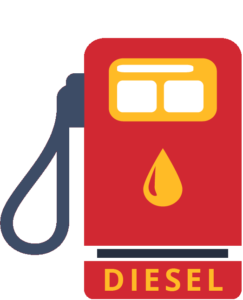When you drive your diesel vehicle often, you get to know it well. The engine’s feel, the performance you can expect, and the efficiency of a good diesel engine become familiar. Sometimes, though, things start to change. You might have to fill your tank more often than you used to, or your truck might not give you the same response when you push the pedal.
There can be many explanations for a change in your diesel vehicle’s performance, but one of the most common causes is a clogged fuel injector. Knowing how to tell if fuel injectors are clogged can save you a lot of aggravation, time, and potentially money if you address the issue before it gets worse.
Symptoms of Clogged Fuel Injectors
Once you know how to tell if fuel injectors are clogged, it can be easy to notice the symptoms.
Reduced Engine Performance
When there is a clog in the injectors, your pistons don’t get the right amount of fuel needed at a given moment. That makes your engine work harder. The RPMs will be lower or inconsistent, and you won’t get the same feel from your vehicle.
Worse Fuel Economy
The harder your engine has to work, the worse your fuel economy will get. If you are filling up more frequently, a clogged injector could be the issue.
Trouble Starting
Another potential sign of clogged injectors is difficulty starting your vehicle. The restricted fuel flow can even prevent your truck from starting at all.
Poor Emissions
The fuel injection issues will carry over to your car or truck’s emissions, which will get noticeably worse as the problem persists.
How to Test Your Fuel Injectors
You can test your fuel injectors to determine if they are clogged. The methods of doing this vary in difficulty and the equipment you will need. Whenever working on your engine, make sure you wear safety gear like eye protection and gloves. Also, make sure the engine is not hot when conducting any tests that involve touching components of your engine.
Listen to Your Injectors
You can test your fuel injectors by turning on your engine, placing the end of a long screwdriver or metal rod against an injector, and then putting your ear to the far end. If you hear clicking traveling up through the rod, then the injector is working.
Use a Test Light
You can get an inexpensive ohm meter or test light that will enable you to touch each injector to see if it is functioning.
Temperature Check
You can carefully check each cylinder by doing a rough temperature check. Start the cold engine, and then flick a little water on each cylinder to see if it burns off. A cold cylinder should become apparent as the functioning cylinders warm up.
What to Do with a Clogged Fuel Injector
If you do indeed have a clogged fuel injector, you have a few options. You can try to clean your injectors yourself with a diesel fuel injection cleaner. However, if the injectors are highly clogged, this might not do the trick. Injection cleaners tend to be better for preventing clogging than for cleaning out current blockages.
The primary treatment for a clogged fuel injector is to remove it, take it apart, and clean it. This can be tricky, though. If parts get damaged or not put together correctly, the injector will not function. Your best bet is likely to take it to a skilled technician to inspect and clean the problem injector.
The best way to address clogged injectors is to prevent them from occurring. Regularly add diesel fuel injection cleaner when you fill your tank, do an occasional thorough fuel injection cleaning, and make sure you get the best fuel injectors you can from Dieselogic.
